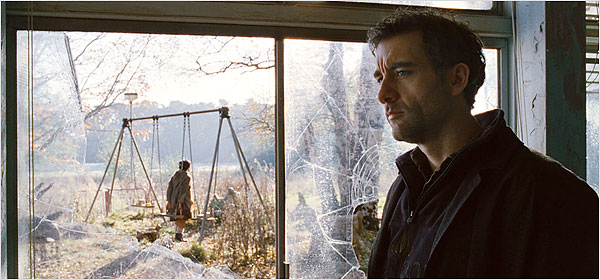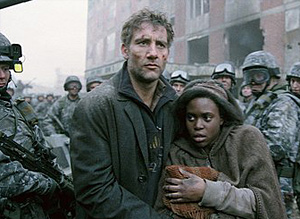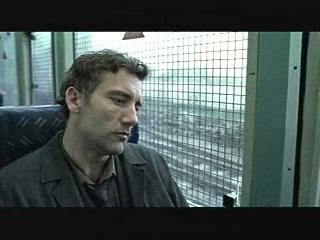January 26, 2007
coffee bars and internment camps

I've finally seen Children of Men, on DVD, after missing it at the cinema. Watching it last week I asked myself, why is its rendering of apocalyspe so contemporary?
British cinema, for the last thirty years as chronically sterile as the issueless popluation in Children of Men, has not produced a version of the apocalypse that is even remotely as well realised as this. You would have to turn to television - to the last Quatermass serial or to Threads, almost certainly the most harrowing television programme ever broadcast on British TV - for a vision of British society in collapse that is as compelling. Yet the comparison between Children of Men and these two predecessors points to what is unique about the film; the final Quatermass serial and Threads still belonged to Nuttall's bomb culture, but the anxieties with which Children of Men deals have nothing to do with nuclear war.
Children of Men reinforces what few would doubt, but which British cinema would seldom lead you to suspect: the British landscape bristles with cinematic potential. It's long since been evident that only someone outside the self-serving, self-pitying low gene pool of British cinema is capable of realising this potential, and Children of Men's director, Alfonso Cuarón, and cinematographer, Emmanuel Lubezki, are both Mexican. Together they have produced a portrait of Grim Britannia that is like a film equivalent of the Burial LP (and the film's excellent soundtrack features Burial's mentor and label-mate, Kode9).
Lubezki's cinematography is breathtaking. His photography seems to leech all organic and naturalistic vitality from the images, leaving them a washed-out grey-blue. The effect is something like a visual equivalent of the 'muting' about which Woebot speaks so eloquently in his latest broadcast. As David Edelstein put it in an insightful review in New York Magazine: ' The movie calls to mind an early description in Cormac McCarthy’s overwrought but gripping post-apocalypse novel The Road of gray days “like the onset of some cold glaucoma dimming away the world.”' The lighting is masterly: it as if the whole film takes place in a permanent winter afternoon when even the sun is dying. White smoke, its source unspecified, curls ubiquitously.
Cuarón's trick is to combine this despondent lyricism with a formal realism, achieved through the expert use of hand-held camera and long takes. Blood spatters onto the camera lens and goes unwiped. The gunfire is as oppressively tactile as it was in Saving Private Ryan. The meticulously choreographed long takes - technical feats of some magnitude - have justly been highly praised, and they are all the more remarkable because they go beyond the familiar role of simulating documentary realism to serve a political and artistic vision.
This brings us back, then, to my initial question, and I think that there are three reasons that Children of Men is so contemporary.
Firstly, the film is dominated by the sense that the damage has been done. The catastrophe is neither waiting down the road, nor has it already happened. Rather, it is being lived through. There is no punctual moment of disaster; the world doesn't end with a bang, it winks out, unravels, gradually falls apart. What caused the catastrophe to occur, who knows; its cause lies long in the past, so absolutely detached from the present as to seem like the caprice of a malign being: a negative miracle, a malediction which no penitence can ameliorate. Such a blight can only be eased by an intervention that can no more be anticipated than was the onset of the curse in the first place. Action is pointless; only senseless hope makes sense. Superstition and religion, the first resorts of the helpless, proliferate.
Secondly, Children of Men is a dystopia that is specific to late capitalism. This isn't the familiar totalitarian scenario routinely trotted out in cinematic dystopias (see, for example, V for Vendetta, which, incidentally, compares badly with Children of Men on every point).
If, as Wendy Brown has so persuasively argued, neo-liberalism and neo-conservatism can be made compatible only at the level of dreamwork, then Children of Men renders this oneiric suturing as a nightmare. In Children of Men, public space is abandoned, given over to uncollected garbage and to stalking animals (one especially resonant scene takes place inside a derelict school, through which a deer runs). But, contrary to neo-liberal fantasy, there is no withering away of the State, only a stripping back of the State to its core military and police functions. In this world, as in ours, ultra-authoritarianism and Capital are by no means incompatible: internment camps and franchise coffee bars co-exist.

In P.D. James' novel, democracy is suspended and the country is ruled over by a self-appointed Warden. Wisely, the film downplays all this. For all that we know, the Britain of the film could still be a democracy, and the authoritarian measures that are everywhere in place could have been implemented within a political structure that remains, notionally, democratic. The War on Terror has prepared us for such a development: the normalisation of crisis produces a situation in which the repealing of measures brought in to deal with an emergency becomes unimaginable (when will the war be over?) Democratic rights and freedoms (habeas corpus, free speech and assembly) are suspended while democracy is still proclaimed.
Children of Men extrapolates rather than exaggerates. At a certain point, realism flips over into delirium. Bad dream logic takes hold as you go through the gates of the Refugee Camp at Bexhill. You pass through buildings that were once public utilities into an indeterminate space - Hell as a Temporary Autonomous Zone - in which laws, both juridical and metaphysical, are suspended. A carnival of brutality is underway. By now, you are homo sacer so there's no point complaining about the beatings. You could be anywhere, provided it's a warzone: Yugoslavia in the 90s, Baghdad in the 00s, Palestine any time. Graffiti promises an intifada, but the odds are overwhelmingly stacked in favour of the State, which still packs the most powerful weapons.
The third reason that Children of Men works is because of its take on cultural crisis. It's evident that the theme of sterility must be read metaphorically, as the displacement of another kind of anxiety. (If the sterility were to be taken literally, the film would be no more than a requiem for what Lee Edelman calls 'reproductive futurism', entirely in line with mainstream culture's pathos of fertility.) For me, this anxiety cries out to be read in cultural terms, and the question the film poses is: how long can a culture persist without the new? What happens if the young are no longer capable of producing surprises?
Children of Men connects with the suspicion that the end has already come, the thought that it could well be the case that the future harbours only reiteration and repermutation. Could it be, that is to say, that there are no breaks, no 'shocks of the new' to come? Such anxieties tend to result in a bi-polar oscillation: the 'weak messianic' hope that there must be something new on the way lapses into the morose conviction that nothing new can ever happen. The focus shifts from the Next Big Thing to the last big thing - how long ago did it happen and just how big was it?

The key scene in which the cultural theme is explicitly broached comes when Clive Owen's character, Theo, visits a friend Battersea power station, which is now some combination of government building and private collection. Cultural treasures - Michelangelo's David, Picasso's Geurnica, Pink Floyd's inflatable pig - are preserved in a building that is itself a refurbished heritage artefact. This is our only gilmpse into the lives of the elite. The distinction between their life and that of the lower orders is marked, as ever, by differential access to enjoyment: they still eat their artfully presented cusisine in the shadow of the Old Masters. Theo, asks the question how all this can matter if there will be no-one to see it? The alibi can no longer be future generations, since there will be none. The response is nihilistic hedonism: 'I try not to think about it'.
T.S. Eliot looms in the background of Children of Men, which, after all, inherits the theme of sterility from The Waste Land. The film's closing epigraph 'shantih shantih shantih' has more to do with Eliot's fragmentary pieces than the Upanishads' peace. Perhaps it is possible to see the concerns of another Eliot - the Eliot of 'Tradition and the Individual Talent' - ciphered in Children of Man. It was in this essay that Eliot, in anticipation of Bloom, described the reciprocal relationship between the canonical and the new. The new defines itself in response to what is already established; at the same time, the established has to reconfigure itself in response to the new. Eliot's claim was that the exhaustion of the future does not even leave us with the past. Tradition counts for nothing when it is no longer contested and modified. A culture that is merely preserved is no culture at all. The fate of Picasso's Geurnica - once a howl of anguish and outrage against Fascist atrocities, now a wall-hanging - is exemplary. Like its Battersea hanging space in the film, the painting is accorded 'iconic' status only when it is deprived of any possible function or context.
A culture which takes place only in museums is already exhausted. A culture of commemoration is a cemetry. No cultural object can retain its power when there are no longer new eyes to see it.
Posted by mark at January 26, 2007 10:25 PM | TrackBack